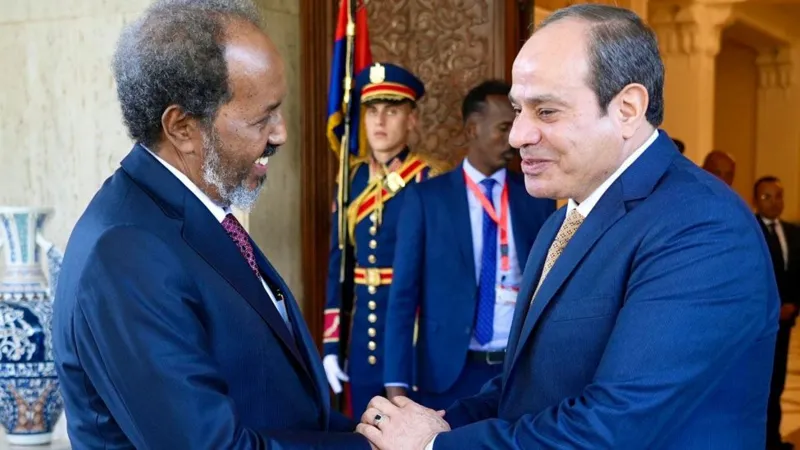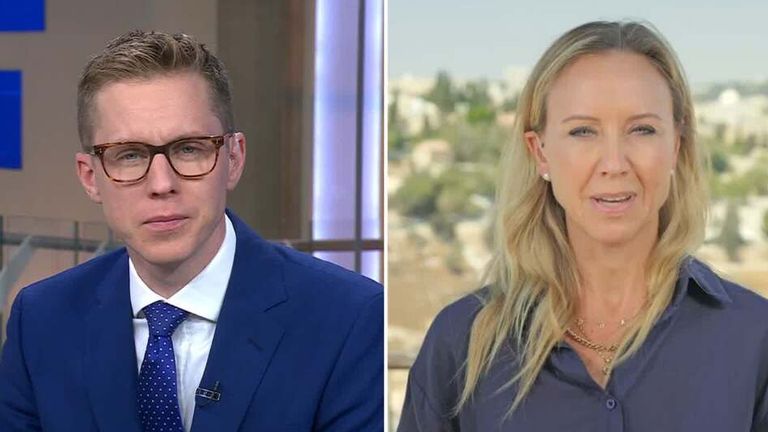Why Ethiopia is so alarmed by an Egypt-Somalia alliance
A military alliance between Somalia and Egypt is ruffling feathers in the fragile Horn of Africa, upsetting Ethiopia in particular - and there are worries the fallout could become more than a war of words.

The tensions ratcheted up this week with the arrival of two Egyptian C-130 military aeroplanes in Somalia’s capital, Mogadishu, signalling the beginning of the deal signed earlier in August during a state visit by the Somali president to Cairo.
The plan is for up to 5,000 Egyptian soldiers to join a new-look African Union force at the end of the year, with another 5,000 reportedly to be deployed separately.
Ethiopia, which has been a key ally of Somalia in its fight against al-Qaeda-linked militants and is at loggerheads with Egypt over a mega dam it built on the River Nile, said it could not “stand idle while other actors take measures to destabilise the region”.
Somalia’s defence minister hit back, saying Ethiopia should stop “wailing” as everyone “will reap what they sowed” - a reference to their diplomatic relations that have been on a downward spiral for months.
Why are Ethiopia and Somalia at odds?
It all comes down to the ambitions of Ethiopia’s Prime Minister Abiy Ahmed, who wants his landlocked country to have a port. Ethiopia lost its access to the sea when Eritrea seceded in the early 1990s.
On New Year’s Day, Mr Abiy signed a controversial deal with the self-declared republic of Somaliland to lease a 20km (12-mile) section of its coastline for 50 years to set up a naval base.
It could also potentially lead to Ethiopia officially recognising the breakaway republic - something Somaliland is pushing hard for.
Somaliland broke away from Somalia more than 30 years ago, but Mogadishu regards it very much as part of its territory - and described the deal as an act of “aggression”.
Somalia fears such a move might set a precedent and encourage other countries to recognise Somaliland's independence, geopolitical analyst Jonathan Fenton-Harvey told the BBC.
He added that neighbouring Djibouti was also worried it could harm its own port-dependent economy, as Ethiopia has traditionally relied on Djibouti for imports.
In fact in an attempt to deescalate tensions, Djibouti’s foreign minister has told the BBC his country is ready to offer Ethiopia “100%” access to one of its ports.
“It will be in the port of Tadjoura - 100km [62 miles] from the Ethiopia border,” Mahmoud Ali Youssouf told BBC Focus on Africa TV.
This is definitely a change of tune for as recently as last year, a senior presidential adviser said Djibouti was reluctant to offer its neighbour unfettered access to the Red Sea.
Attempts so far to calm tensions - by Turkey - have failed, with Somalia insisting it will not budge until Ethiopia recognises its sovereignty over Somaliland.
Why is Ethiopia so upset by Somalia’s reaction?
Somalia has not only brought its Nile enemy Egypt into the mix, but also announced that Ethiopian troops would not be part of the AU force from next January.
This is when the AU’s third peace support operation begins - the first one was deployed in 2007 months after Ethiopian troops crossed over the border to help fight al-Shabab Islamist militants, who then controlled the Somali capital.
There are at least 3,000 Ethiopian troops under the current AU mission, according to the Reuters news agency.
Last week, the Somali prime minister also said Ethiopia would have to withdraw its other 5-7,000 soldiers stationed in several regions under separate bilateral agreements - unless it withdrew from the port deal with Somaliland.
Ethiopia sees this as a slap in the face for, as its foreign minister put it, “the sacrifices Ethiopian soldiers have paid” for Somalia.
The withdrawal of troops would also leave Ethiopia vulnerable to jihadist attacks, Christopher Hockney, a senior researcher at the Royal United Services Institute, told the BBC.
The planned deployment of Egyptian troops along its eastern border would also make Ethiopia particularly apprehensive, he added.
Egypt sees Ethiopia’s Nile dam - in the west of the country - as an existential threat – and has warned in the past that it will take “measures” should its security be threatened.
Why is the Nile dam so contentious?
Egypt accuses Ethiopia of threatening its supply of water with the construction of the Grand Ethiopian Renaissance Dam (Gerd).
This began in 2011 on the Blue Nile tributary in Ethiopia’s northern-western highlands, from where 85% of the Nile's water flow.
Egypt said Ethiopia pushed forward with the project in complete “disregard” of the interests and rights of downstream countries and their water security.
It also argued that a 2% reduction in water from the Nile could result in the loss of around 200,000 acres (81,000 hectares) of irrigated land.
For Ethiopia the dam is seen as a way of revolutionising the country by producing electricity for 60% of the population and providing a constant flow of electricity for businesses.
The latest diplomatic efforts to work out how the dam should operate - and determine how much water will flow downstream to Sudan and Egypt - fell apart last December.
How worried should we be?
Egypt sees its military deal with Somalia as “historic” - in the words of Egyptian President Abdul Fattah al-Sisi - and a possible chance to settle scores over the mega dam.
Indeed the Nile dispute may well play out in Somalia, warns Dr Hassan Khannenje, the director of the Horn International Institute for Strategic Studies.
It could potentially lead to a “low-scale inter-state conflict” between Ethiopia and Egypt if their troops meet at the Somalia border.
Somaliland has also warned that the establishment of Egyptian military bases within Somalia could destabilise the region.
Both Ethiopia and Somalia are already coping with their own internal strife - Ethiopia with low-level rebellions in several regions and Somalia, recovering from a destructive 30-year civil war, still has al-Shabab to contend with.
Experts say neither can afford further warfare - and more unrest would inevitably lead to further migration.
Dr Khannenje told the BBC that if a conflict broke out, it could further complicate the geopolitics of the Red Sea by drawing in other players and further affect global trade.
At least 17,000 ships go through the Suez Canal each year, meaning that 12% of annual global trade passes through the Red Sea, amounting to $1tn (£842bn) worth of goods, according to shipping monitor Lloyd’s List.
For this reason, countries like Saudi Arabia, the United Arab Emirates (UAE) and Turkey have been keen to forge partnerships with African nations like Somalia that border the Red Sea.
According to Mr Harvey, Turkey and the UAE stand a better chance at mediating and finding a middle ground.
The UAE has heavily invested in Somaliland’s Berbera port and holds significant influence over Ethiopia because of its investments there.
All eyes will be on the next diplomatic push by Turkey, which has ties with both Ethiopia and Somalia. Talks are due to start in mid-September.
-BBC






